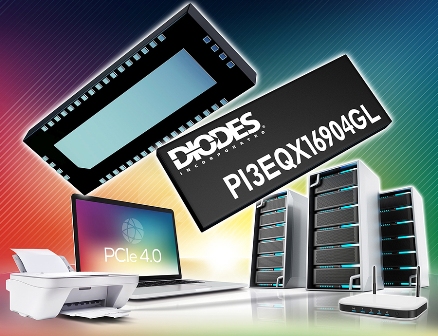Plano, Texas – April 18, 2019 – Diodes Incorporated (Nasdaq: DIOD), a leading global manufacturer and supplier of high-quality application specific standard products within the broad discrete, logic, analog and mixed-signal semiconductor markets, today introduced a ReDriver for the server, storage, and networking market segment. The PI3EQX16904GL is a PCIe 4.0 compliant, 2.5Gbps to 16Gbps, four-differential channel, linear ReDriver. The device provides programmable linear equalization, output swing, and flat gain to optimize performance over a variety of physical media by reducing inter-symbol interference. It is the industry’s first available ReDriver to support PCIe 4.0 while being backward-compatible with PCIe 3.0/2.0/1.0. Target applications for the device include storage and AI servers, workstations, 5G networking, CPU-to-network (PCIe NIC card) and CPU-to-storage (NVME) interconnects, and CPU-to-CPU interconnects within high-performance compute clusters.
 The ReDriver, also known as a repeater IC, regenerates signals to boost the signal quality of high-speed interfaces. Faster signal frequencies leave designers with less signal margin with which to design reliable, high-performance systems. Using equalization, pre-emphasis, and other technologies, a single ReDriver can adjust and correct for known channel losses at the transmitter and restore signal integrity at the receiver. This enables reliable communications with low bit error rates (BER).
The ReDriver, also known as a repeater IC, regenerates signals to boost the signal quality of high-speed interfaces. Faster signal frequencies leave designers with less signal margin with which to design reliable, high-performance systems. Using equalization, pre-emphasis, and other technologies, a single ReDriver can adjust and correct for known channel losses at the transmitter and restore signal integrity at the receiver. This enables reliable communications with low bit error rates (BER).
The PI3EQX16904GL supports four 100Ω differential current mode logic (CML) data I/Os and extends the signals across other distant data pathways on the user’s platform. Linear ReDrivers are commonly used to achieve PCB trace extension while minimizing cost and power consumption. They can also deliver lower latency.
Requiring a supply voltage of 3.3V ±0.3V, the device is able to operate over an industrial temperature range of -40˚C to +85˚C.
The PI3EQX16904GL ReDriver is offered in a 42-contact TQFN (9mm x 3.5mm) package and is priced at $6.00 each in 3000 piece quantities.
Further information is available at www.diodes.com






